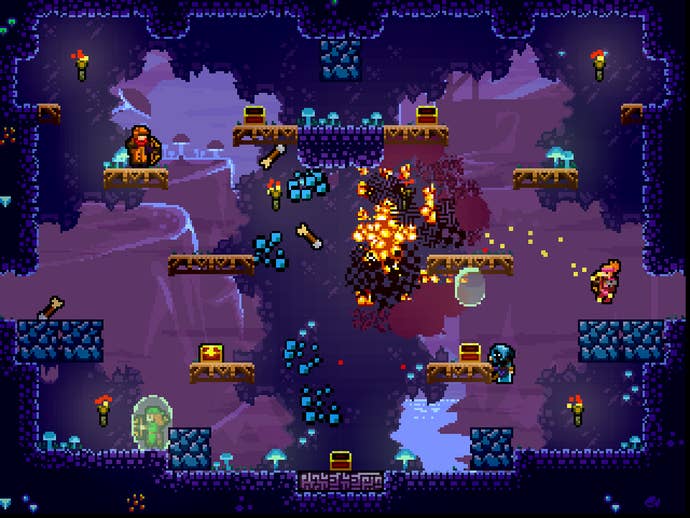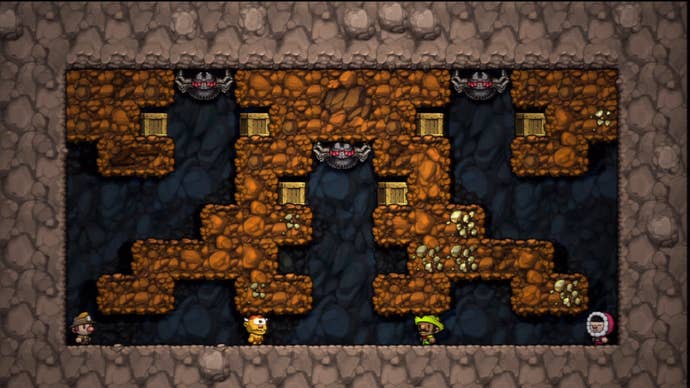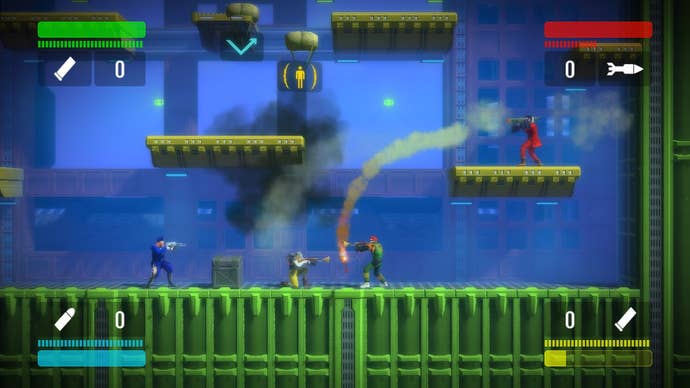Local Multiplayer is Gaming's Holy Grail
And, until recently, argues Eurogamer's Jeffrey Matulef, the industry had completely forgotten about it.
This article first appeared on USgamer, a partner publication of VG247. Some content, such as this article, has been migrated to VG247 for posterity after USgamer's closure - but it has not been edited or further vetted by the VG247 team.
In the last year I had an epiphany. It turned out that my favorite genre of gaming is one I'd written off my entire adult life: the easy to pick up, but hard to master local multiplayer game.
It all began last summer when I was feeling mopey and despondent following the end of a relationship -- something not aided by September's transition from pleasant climates to an impending eight months of dreary yuck. It was the last weekend of nice weather we'd have and I wanted to go out on the town, be around lots of people, and cruise my way through Saturday Night like John Travolta in a certain '70s movie about the disco scene. Unfortunately, I didn't know of anything going on that night, so I reluctantly agreed to go to a game night at my friend's house. I hope you'll forgive me for saying that spending the last warm Saturday of the year playing video games with a bunch of dudes in a basement wasn't exactly the sort of adventurous outing I had in mind.
It's not that I didn't like games -- I think my job description suggests that it's a thing I'm quite passionate about -- but rather games didn't seem like they'd fulfil whatever was missing from my life at the time. Single-player games can be wonderful experiences, but they're rather isolating by nature. Online games pull together people from across the world, but their social interactions tend to be lacking to say the least.
As such, I've always kept my social life and my gaming life separate. Games were something I did when I was at home and my friends were all busy. When hanging out with other people, I'd rather engage them in conversation. The long running joke with my best friend and I is that we'd frequently stay up until sunrise talking about games, but we'd probably spent less than an hour actually playing them together in the span of six years. What can I say? We like to talk.

You don't talk much when playing games with others. You might say things like "go kill that dude" or "protect Bravo point" or exclaim any number of profanities upon a getting killed. It's not exactly My Dinner With Andre or The Mental Illness Happy Hour if you know what I mean.
These sorts of shallow, benign interactions never interested me much. I always enjoyed video games for their sense of place, mood, puzzles, and reflex-based challenges. I was fascinated by their struggle to tell a story or make a message with the inherent schism of an active participant bruising through the artists' work with the grace of a bull in a china shop. I liked games that cleverly used their interactivity to make a statement or enhance their storytelling. Games like Papers, Please, Little Inferno, Gone Home, or The Walking Dead. Simply trading blows and reallocating points with one another didn't seem like a much more worthwhile pursuit than, say, wanking. For someone who writes about video games for a living, I've had some deep-rooted feelings of judgment and guilt tied to my time spent with the medium.
Sometimes, it's good to be wrong.
With those preconceptions in the way, my pals and I booted up Spelunky's multiplayer. A little background: Spelunky is my favorite game of all time. I've conquered its secret last level many a time and have bested every secret stage and seen every item at one point or another. I know Spelunky well. That being said, I'd never even touched multiplayer Spelunky. Who knew what I'd been missing out on?

There are dozens of maps and a multitude of options in multiplayer Spelunky, but for whatever reason, we found a map we liked and stuck with it. A single-screen affair where three large spiders guard six item boxes, we upped the hit point count to seven and went into what would be an unforgettable hour of mayhem. Now I know my Spelunky, but what's this? A knife that slaughters anyone in one hit and doesn't show up on one's persons? A shield that can deflect bullets and smoosh other players into walls? A gun that can destroy giant chunks of the scenery? Maybe I hadn't seen it all.
Despite being new to this mode, my old skills still came in handy. You've got a shotgun? Well I've got ropes that can be used for daring escapes and I know the reload time on that blunderbuss. Try to smash me against a wall and I'll be sure to take you to hell with me with sticky bombs. If I'm really out of options, maybe I can disarm an opponent by dropping a friggin' teleporter on their head and snatch their dropped freeze ray before hopping on their cold, soon-to-be-dead hands.

This wasn't the only game that I'd played to death that included a whole second multiplayer mode that I'd forgotten existed. Bionic Commando: Rearmed came up next on our queue and though I was adept in its single-player campaign, dueling against other humans requires an entirely different skill set -- not to mention that the game has a really peculiar control scheme. This wasn't as intuitive for me, but I went from being the worst player in the room by a country mile to the worst player in the room by a hair. A few more rematches and I was liable to be holding my own. I'm not sure how it happened, but time skipped ahead to 3a.m. and my friends opted to get on with this whole going to bed thing. Wimps.
The truth is, I ended up having more fun that night than I'd had in months. I was smiling. I was laughing. I was spending not just minutes but hours on end not thinking about the things that were getting me down. For my stupid, obsessive, neurotically masochistic brain, that was quite the accomplishment.
I still love single-player games. I love some online ones too (From's Souls series being a personal fave). But I maintain that these are lonely experiences. Local multiplayer, however, is a whole other ballgame that combines the ambient social connectivity of dancing, concert going, and party hopping with the laser-like resolve the medium requires. To wit: it's difficult to think about one's own broken heart when you're too busy trying to pierce your friends' still beating space dolphin hearts in Starwhal: Just the Tip. Truth.
Ultimately, I realised that simply playing games in the immediate vicinity of other people lifted my spirits and brought me more unadulterated joy than I'd experienced in ages. Did these local multiplayer experiences slake my thirst for whatever I was lacking in life? Perhaps not, but I went to sleep happy. During such a time, that was no small achievement.
